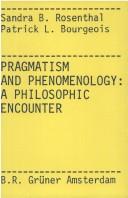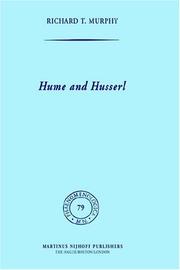| Listing 1 - 3 of 3 |
Sort by
|

ISBN: 9060321790 9027272603 1283903385 9789060321799 9789027272607 Year: 1980 Publisher: Amsterdam Grüner
Abstract | Keywords | Export | Availability | Bookmark
 Loading...
Loading...Choose an application
- Reference Manager
- EndNote
- RefWorks (Direct export to RefWorks)
In the philosophic world today, pragmatism and phenomenology can be found standing at a crossroad. Though each has arrived there via divergent paths and for very different reasons, the direction that each takes in the future may be significantly influenced by the suggestions the other has to offer. The intention of this book is to parallel the two positions in such a way that basic points of convergence and divergence are noted and accounted for in terms of their systematic significance. Each position is presented in such a manner that philosophers engrossed in one movement can enter into the
Pragmatism --- Phenomenology --- Experience --- A priori --- Theory of knowledge --- Apriori --- Knowledge, Theory of --- Logic --- Reasoning --- Philosophy --- Psychology --- Reality --- Philosophy, Modern --- Idealism --- Positivism --- Realism --- Utilitarianism --- Truth --- Pragmatism. --- Phenomenology. --- Experience. --- A priori.
Book
Year: 1980 Publisher: The Hague ; Boston, MA ; London : Martinus Nijhoff,
Abstract | Keywords | Export | Availability | Bookmark
 Loading...
Loading...Choose an application
- Reference Manager
- EndNote
- RefWorks (Direct export to RefWorks)
Husserl (edmund), philosophe allemand, 1859-1938 --- Connaissance, theorie de la --- Hume (david), philosophe anglais, 1711-1776 --- Subjectivite --- Phenomenologie --- A priori --- Constitution (philosophie) --- Husserl (edmund), philosophe allemand, 1859-1938 --- Connaissance, theorie de la --- Hume (david), philosophe anglais, 1711-1776 --- Subjectivite --- Phenomenologie --- A priori --- Constitution (philosophie)

ISBN: 9024721725 9048182581 9401743924 9789024721726 Year: 1980 Volume: 79 Publisher: The Hague Nijhoff
Abstract | Keywords | Export | Availability | Bookmark
 Loading...
Loading...Choose an application
- Reference Manager
- EndNote
- RefWorks (Direct export to RefWorks)
To become fully aware of the original and radical character of his transcendental phenomenology Edmund Husserl must be located within the historical tradition of Western philosophy. Although he was not a historian of philosophy, Husserl's his torical reflections convinced him that phenomenology is the necessary culmination of a centuries-old endeavor and the solution to the contemporary crisis in European science and European humanity itself.l This teleological viewpoint re quires the commentator to consider the tradition of Western philosophy from Husserl's own perspective. Husserl maintained that the Cartesian tum to the "Cogito" represents the crucial breakthrough in the historical advance of Western thought toward philosophy as rigorous science. Hence 2 he concentrated almost exclusively on the modem era. Much has been written of Husserl's relationship to Descartes, Kant, and the neo-Kantians. His connections with Locke, Berkeley, and Hume have not been examined as closely despite his fre quent allusions to these British empiricists. Among these thinkers David Hume gained from Husserl the more extensive considera tion. Commentators have pointed out correctly that Husserl always criticized unsparingly Hume's sheer empiricistic approach to the problem of cognition. Such an approach, in Husserl's view, can only result in the "naturalization of consciousness" from which stem that "psychologism" and "sensualism" which lead Hume inevitably into the contradictory impasse of solipsism 3 and skepticism.
Theory of knowledge --- Husserl, Edmund --- Hume, David --- Knowledge, Theory of --- Subjectivity --- Phenomenology --- A priori --- Constitution (Philosophy) --- Théorie de la connaissance --- Subjectivité --- Phénoménologie --- Constitution (Philosophie) --- Hume, David, --- Husserl, Edmund, --- Contributions in theory of knowledge --- 1 HUME, DAVID --- Academic collection --- #GROL:SEMI-1-05'19' Huss --- Subjectivism --- Relativity --- Philosophy, Modern --- Epistemology --- Philosophy --- Psychology --- Apriori --- Logic --- Reasoning --- Filosofie. Psychologie--HUME, DAVID --- -Husserl, Edmund --- -ヒューム --- A priori. --- Knowledge, Theory of. --- Phenomenology. --- Subjectivity. --- 1 HUME, DAVID Filosofie. Psychologie--HUME, DAVID --- -Contributions in theory of knowledge --- Constitution (Philosophy). --- Théorie de la connaissance --- Subjectivité --- Phénoménologie --- Husserl, Edmond --- Contributions in theory of knowledge. --- Hume, David, - 1711-1776 --- Husserl, Edmund, - 1859-1938
| Listing 1 - 3 of 3 |
Sort by
|

 Search
Search Feedback
Feedback About UniCat
About UniCat  Help
Help News
News